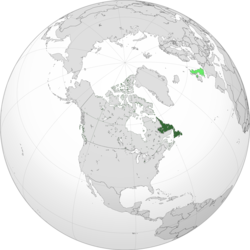Province of Avalon
| Province of Avalon | ||||||||||
| British colony | ||||||||||
|
||||||||||
| Capital | Ferryland, Newfoundland | |||||||||
| Languages | English | |||||||||
| Government | Constitutional monarchy | |||||||||
| Governor | Sir George Calvert | |||||||||
| Legislature | Lords Proprietors | |||||||||
| Historical era | Colonial Era | |||||||||
| • | London and Bristol Company charter | 1610 | ||||||||
| • | Destroyed by New France in the Avalon Peninsula Campaign | 1696 | ||||||||
| Currency | Pound sterling | |||||||||
|
||||||||||
Province of Avalon was the area around the settlement of Ferryland, Newfoundland and Labrador, in the 17th century, which upon the success of the colony grew to include the land held by Sir William Vaughan and all the land that lay between Ferryland and Petty Harbour.
The Avalon Peninsula was one of the first European-inhabited areas in North America. In 1497 the Bristol Guild of Merchants financed a voyage by John Cabot to Newfoundland, where he is reported to have landed at Cape Bonavista. Breton, Basque, and Portuguese fishermen spoke of "a land of codfish". They were familiar with the Avalon Peninsula where many would set up temporary shelters to dry fish.
In the early 17th century English merchants began to take an interest in the Newfoundland fishery. The Bristol Society of Merchant Venturers established the London and Bristol Company (the Newfoundland Company) in 1608 and sent John Guy, to locate a favourable location for a colony. The first permanent English settlement was established at Cuper's Cove in 1610.
The company was granted a charter by James I on May 2, 1610 giving it a monopoly in agriculture, mining, fishing and hunting on the Avalon Peninsula. They retained exclusive rights until 1616 when the Crown began to grant lands to others.
...
Wikipedia



